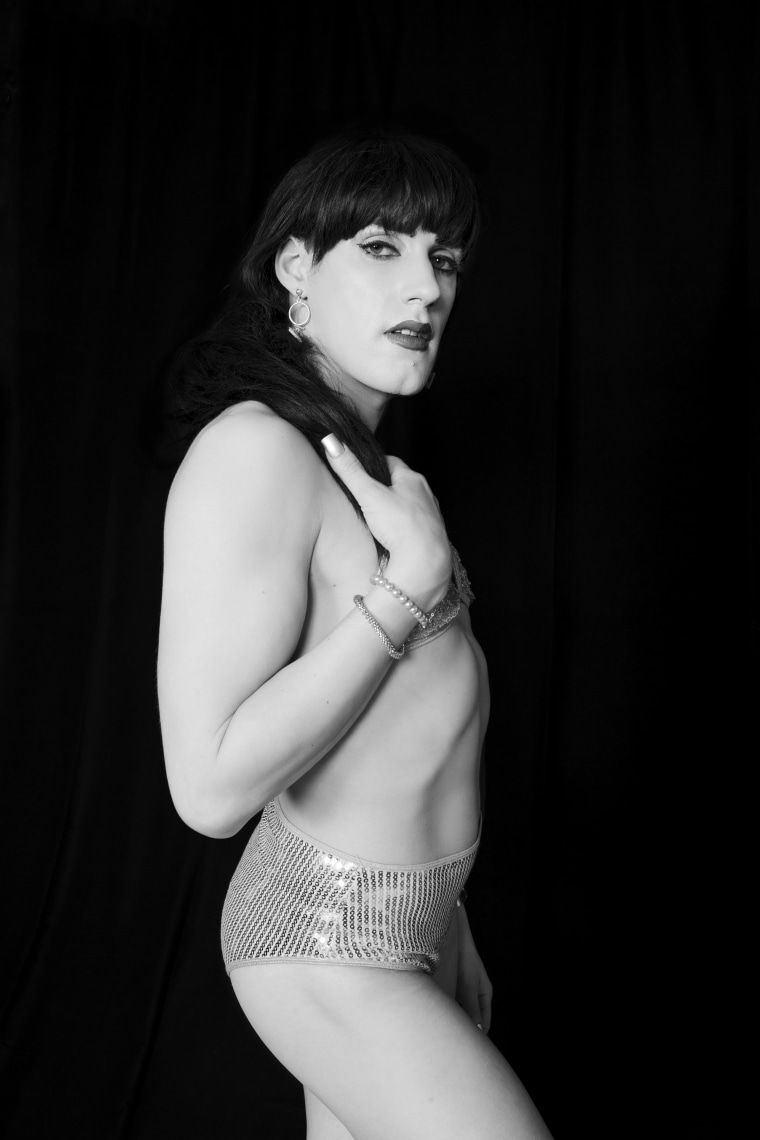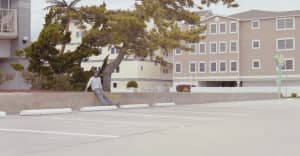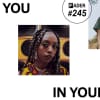La Neve’s “Soft Power” is a brash anthem about subtle coersion
The new track will open their forthcoming EP, History Solved, due out April 15.
 Photo by Jen Dessinger.
Photo by Jen Dessinger.
Joey La Neve DeFrancesco has shared a new track titled "Soft Power" as they mobilize for the April 15 arrival of their second solo project, History Solved. The five-track tape is a follow-up to The Vital Cord, their 2019 debut LP as La Neve. Best known as the guitarist for the fiery political punk band Downtown Boys, for their organizing work in their native Providence, Rhode Island, and for quitting their job at the Providence Renaissance Downtown Hotel with a full marching band in tow, DeFrancesco has slipped into the role of synth-punk auteur with ease, making highly danceable tunes without abandoning the leftist bent of their songwriting.
DeFrancesco announced History Solved earlier this month and released its lead single and title track the same day. Whereas The Vital Chord reveled in automated instrumentals, "History Solved" emphatically reintroduced live drumming into the mix in the form of Karna Ray. On "Soft Power," the EP's prospective opener, Ray is still present but sits further back in the mix, splitting duty with a drum machine and letting a gorgeous bed of synths and take precedent.
The track's title is a political term widely used in reference to covert organizations such as the CIA in imperialist nations like our own, who use co-option rather than coercion to get what they want. Here, DeFrancesco applies the phrase to personal conflicts, expertly tying hyper-local local psychosexual relationships to international relations. Their persona in the song seems to take pleasure in their ability to exercise soft power over a romantic partner, and the brash, triumphant instrumental seems to agree.
Listen to "Soft Power" and read La Neve's interview with The FADER below.
You're one of the few contemporary musicians whose work, both with Downtown Boys and as La Neve, is at once explicitly political and artistically interesting in a post-Trump world. Why do you think this is such a hard balance to strike, and what's your secret to striking it so well? And who are some other artists/groups who you think are doing a good job at this?
First, thanks so much for saying that, that's nice to hear. I think the projects I've been in have been part of a similar political project since I started in the mid 2010s. Most of Downtown Boys' songs were written pre-Trump, then we obviously continued into the Trump years, and I'm still on it now. Obviously, the contours of the issues change, but I think the project of building working class power has stayed the same. Downtown Boys' songs about immigration, ICE, and deportations, for instance, were equally relevant under Obama, Trump, and now also Biden. These things are my focus as an organizer, so that's what ends up coming out in the music. There are a number of artists who I've been performing with or in a similar orbit to for years who have absolutely maintained a powerful politics while continuously pushing things artistically. Moor Mother, Abdu Ali, DJ Haram, my Downtown Boys' bandmates' other projects (such as Gauche, Clear Channel, Pinkwash, many others), Karna Ray's other projects like The Kominas and Unibrow, Shamir, Sadie Dupuis' projects, Algiers, Soul Glo, Special Interest. I could go on for a while!
Outside your music, I know you work full time as an organizer, and I've read some of your writing in Jacobin, which, in a similar vein, is one of the few contemporary publications that consistently combines nuanced cultural criticism with a hardcore leftist politic. Do you have any favorite living writers who you feel do this particularly well?
A shift I'm happy to see is that many people are finally coming to understand the connection between economics and cultural development, and the need for culture workers to act collectively to build our power and redistribute resources. For instance, we've built a new organization called Union of Musicians and Allied Workers (UMAW) over the past two years to organize independent musicians to demand higher pay from streaming services like Spotify, fight for fairer performance spaces, run solidarity projects, and more. Other culture workers have been similarly organizing, as we see in the rise of museum unions, and as I'm writing this I just saw the announcement of a new Conde Naste union. There are some writers covering these developments, such as Damon Kurkowski, who was also one of the co-founders of UMAW. I like Edward Ongweso Jr's writing on tech and labor, as many of our fights as music workers are on that terrain. I've been getting into the Tech Wont Save Us podcast with Paris Marx, that's also often at that tech/labor intersection.
"Soft Power" reminds me (more thematically than musically, but also a little bit musically) of Throbbing Gristle's "Persuasion." Do you think of "soft power" as a particularly American/imperialist phenomenon, or is it a concept you feel applies to interpersonal relationships as well, regardless of systemic power structures?
I'm always happy with a Throbbing Gristle comparison! I got to see Genesis play in Providence in like 2015, that was big. Yeah, I think the song can work at both of those levels. There's the clear sexual metaphor running through it, but I'm also in that labor/culture headspace I was just discussing. How the economic relationships across our country influence, degrade, and destroy culture and cultural workers. That's certainly going to shape our interpersonal lives.
Who are some of your other favorite artists of the industrial and synth-punk variety?
I love Psychic TV. I've also gotten very into Hanin Elias, Lolita Storm, Atari Teenage Riot, the very politicized digital hardcore era. It seems to be making a comeback through like Machine Girl and some of the harsher hyperpop stuff, though it's much less frequently as politicized now. I mentioned them already, but I love Algiers and their use of industrial elements. I love Debit, who often has these industrial elements, though her excellent new record is more in the ambient space. And Providence has a long tradition of industrial noise.
For the new record, you combine synthesized drum machines with Karna Ray's live drumming, to great effect. As someone who's played straight-ahead punk, non-ska punk with brass, and more synth-based music, what appeals to you about the hybridity of your past and current projects?
I don't think I ever set out to intentionally create hybridity, it's more about building intensity, and adding human elements like live drums, horns, etc. does that for me. I've always loved the larger band out jazz stuff like Sun Ra, Art Ensemble of Chicago, Coltrane's Ascension record, Ornette Colman's Free Jazz record. Building things continuously up and out. I don't think anything I've ever done comes anywhere near that intensity, but I think I'm always striving toward that emotional point.


